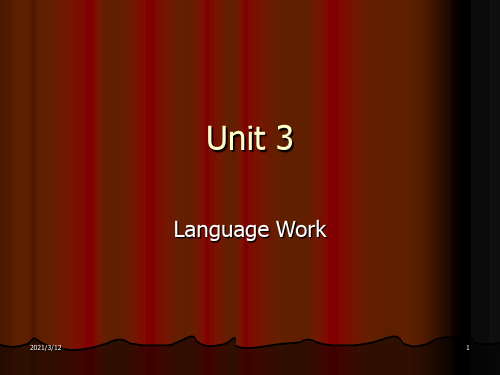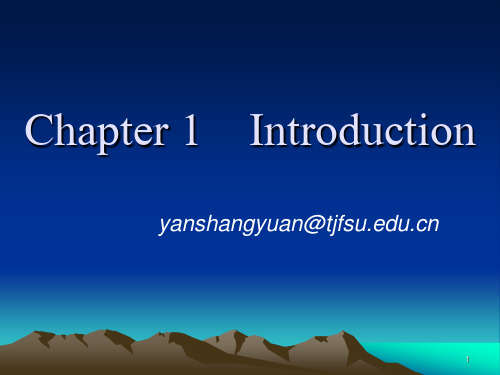新编语言学教程课件1
刘润清《新编语言学教程》Syntax教学PPT课件

tence
Subject
Predicate
a referring expression
comprises a finite verb or a verb phrase and says something about the subject
Introduction
Lexical item 语项 --labels attached to “words”. “Lexical item”
ultimate constituents poor, John, ran, away
Advantages of IC analysis
1. It helps to account for the ambiguity of certain constructions.
e.g. The son of Pharaoh’s daughter is the daughter of Pharaoh’s son.
is a term associated with dictionaries or lexicons. It takes an abstract view of words. --a word has more or less consistent meaning, but can differ because of grammatical function. e.g. do/did/done/doing/does are particular
语言学-第一章ppt课件.ppt

认识到了贫困户贫困的根本原因,才 能开始 对症下 药,然 后药到 病除。 近年来 国家对 扶贫工 作高度 重视, 已经展 开了“ 精准扶 贫”项 目
meaning in a context of language use. Wife: Oh ,darling, I like this gold earring very
much. Husband: You know, I’m now out of job. What is the semantic meaning of the 2
----A person who studies linguistics is known as a linguist.
认识到了贫困户贫困的根本原因,才 能开始 对症下 药,然 后药到 病除。 近年来 国家对 扶贫工 作高度 重视, 已经展 开了“ 精准扶 贫”项 目
II The major branches of linguistics
sentences? What is the pragmatical meaning?
认识到了贫困户贫困的根本原因,才 能开始 对症下 药,然 后药到 病除。 近年来 国家对 扶贫工 作高度 重视, 已经展 开了“ 精准扶 贫”项 目
2.7 Sociolinguistics(社会语言学)is the study of
认识到了贫困户贫困的根本原因,才 能开始 对症下 药,然 后药到 病除。 近年来 国家对 扶贫工 作高度 重视, 已经展 开了“ 精准扶 贫”项 目
Ⅲ Some important distinctions in
新编语言学教程课件

不同语言之间的接触会导 致语言借用、语言替代等 现象,如汉语中的外来词 。
STEP 03
语言消亡与保护
一些弱势语言可能会逐渐 消亡,因此语言的保护和 传承变得尤为重要。
不同语言的混合使用可能 导致新的语言或方言的形 成,如普通话的形成。
Part
04
语言与社会文化
语言与文化的关系
语言是文化的重要组成部分, 是文化传承和发展的载体。
语法的演变
语法的发展变化与语言的发展变 化密切相关,随着社会的变化和 语言的演变,语法也在不断地演 变。
语义
语义的分类
语义可以分为词汇意义、语法意义和语境意义等,词汇意义是词汇的基本意义,语法意 义是句子结构所表Байду номын сангаас的意义,语境意义则是特定语境中产生的附加意义。
语义的演变
语义的发展变化与语言的发展变化密切相关,随着社会的变化和语言的演变,语义也在 不断地演变。
机器翻译
探讨机器翻译的原理、算法和应用,以及如何提高翻 译的准确性和效率。
人机交互
分析人机交互中语言的作用,如语音助手、智能客服 等,以及如何设计更自然的人机对话界面。
THANKS
感谢您的观看
Part
05
语言学应用
语言教学
语言教学方法
探讨不同语言教学方法的优缺点,如语法翻译法 、直接法、听说法等。
语言教材编写
介绍如何根据教学目标和学生的需求,编写有针 对性的语言教材。
语言技能培养
讨论如何培养学生的听、说、读、写、译等语言 技能,以及如何评估学生的学习成果。
语言规划与政策
语言政策制定
词汇的意义
词汇的意义包括概念意义和语境意义,概念意义是 词汇的基本意义,而语境意义则是在特定语境中产 生的附加意义。
新编简明英语语言学教学课件中文版

第一章:绪论1.什么是语言学?1.1定义语言学常被定义为是对语言进行系统科学研究的学科。
语言学研究的不是某一种特定的语言,而是人类所有的语言。
为了揭示语言的本质,语言学家首先要对语言实际使用进行观察,并在此基础上形成有关语言使用的概括性假设,这些初步形成的假设要在语言使用中进行进一步的检验,最终形成一条语言理论。
1.2语言学的研究范畴:语言学研究有不同的侧重。
对语言体系作全面研究的语言学研究称为普通语言学。
语音学主要是对语言声音媒介的研究,它不只是研究某一特定的语言的声音媒介,而是所有语言的声音媒介。
音系学与语音学不同,它主要研究特定语言的语音体系,即音是如何结合在一起产生有意义的单位。
形态学主要研究单词的内部语义结构,及这些叫做词素的语义最小单位是如何结合构成单词。
句法学主要研究构成潜在句子的句法规则。
语义学以研究语义为目的,传统语义学主要研究抽象的意义,独立于语境之外的意义,语用学也是研究语义,但是它把语义研究置于语言使用语境中加以研究。
语言不是一个孤立的现象,而是一种社会现象,各种社会因素都会对语言的使用产生影响。
从社会的角度来研究语言的科学被称之为社会语言学。
语言和社会之间的关系是社会语言学研究的主要内容。
心理语言学主要从心理学的角度来研究语言。
它要研究人们在使用语言时大脑的工作机理,如人是如何习得母语的,人的大脑是如何加工和记忆语言信息等问题。
把语言学的研究成果应用到实践中的科学形成了应用语言学。
狭义上,应用语言学指把语言理论和原则运用于语言教学的科学,在广义上,它指把语言理论与原则应用于解决实际问题的科学。
除此之外还有人类语言学、神经语言学、数学语言学、计算语言学等。
1.3语言学研究中的几对基本概念1.3.1规定性和描述性语言学研究是描述性的,不是规定性的。
这是语言学和传统语法的一个重要区别。
语言学研究的目的是对人们使用的语言进行客观描述与分析,而不是对语言的使用作出规定。
传统语法是规定性的,它主要建立在笔头语言基础之上,旨在规定一系列的语法规则,并且把这些语法规则强加给语言使用者。
新编英语教程1Unit-3-language-workPPT课件

2021/3/12
7
conjure v. to cause (something) to
appear by or as if by magic
e.g. The clever magician conjured a rabbit out of his hat.
tableware n. the plates, glasses, knives,
forks, spoons, etc., used in setting a table for a meal
2021/3/12
5
sponge cake n. a light cake made from eggs, sugar,
slide: a usu. square piece of film in a frame for passing strong light through to show a picture on a surface
e.g. They showed slides of their holiday.
such as pans, tools, etc.
2021/3/12
4
What is it made of? What is it used for?
be used for ---ing
make preparations for sth. / prepare (for) sth. / prepare sth. / be prepared to do sth.
and flour but often no fat
give a short performance of some kind: See Note 4
新编语言学教程 Chapter 1 Introduction(课堂PPT)

1.2 Linguistics vs. Traditional grammar 1.3 The differences between linguistics and
• The course is intended to introduce undergraduates the major components of modern linguistics, the main concerns, explorations, and discoveries of this subject, the principles and methods of its different branches, the views and contributions of influential researchers, and important models and disputes between traditions and schools.
18
The scope or major branches of linguistics
• Theoretical linguistics 1. Phonetics 2. Phonology 3. Morphology 4. Syntax 5. Semantics • Use of linguistics 1. Applied linguistics 2. Sociolinguistics 3. Psycholinguistics
6
1.1.2 Linguistics as a science
刘润清《新编语言学教程》Pragmatics教学课件
Examples of Austin’s Performatives (2)
1. Verdictives: Delivering a verdict • acquit, convict, find, hold, interpret as, understand, read it as, rule, 2. Executives: Giving a decision in favor or against a certain course of action from a position of power. • appoint, name, order, command, fine, grant, nominate, bequeath, pardon, resign, warn, plead, pray, declare open 3. Commissives: Committing the speaker to a course of action; implies obligation • promise, undertake, give my word 4. Behabitives: Adopting an attitude in reaction to the behavior of others apologize, thank, sympathy, attitudes, greetings, wishes, challenges 5. Expositives: Expounding one's views, clarifying • affirm, deny, state, describe, class, identify, remark, mention,
Some basic notions in Pragmatics
语言学教程第一章ppt
语言学教程第一章ppt语言学教程胡壮麟主编Contents ?Chapter 1 Invitations to Linguistics Chapter 2 Speech Sounds(Phonetics) Chapter 3 From Morpheme to Phrase (Morphology)Chapter 4 From Word to Text(Syntax) Chapter 5 Meaning(Semantics)Chapter 6 Language and Cognition ?Chapter 8 Language in Use(Pragmatics)Chapter 1 Invitations to Linguistics ?1.1 Why study linguistics?1.2 What is language?1.3 Features of language1.4. Origin of language1.5. Functions of language1.6. What is linguistics1.7 Main branches of linguistics1.8. Macrolinguistics1.9 Important distinctions in linguisticsLead-inQestion1: Other animals can beat us in many different ways, but what makes us superior to all of them?Qestion2: Why are children easy to undrstand their mother's tongue??Qestion3: Why do people in different social classes speak in different ways??Qestion4: Why is it "I love you" in English, but "私はあなたを愛して" in Japanese?1.2 What is language ?Language is a system of arbitrary vocal symbols used for human communication.__ by (英)沃德霍(Wardhaugh,R.)1.3 Design Features of languageArbitrarinessDualityCreativityDisplacement1.3.1 Arbitrariness ?Arbitrariness: the forms of linguistic signs bear no natural relationship to their meaning –Saussure.Eg: name,book,pen(1) Arbitrary relationship between the sound of a morpheme and its meaning.Eg: Hi, Aha,Hush, Hem, Hey.(2) Arbitrariness at the syntactic level: according to systemic-functionalists and American functionalists, language is not arbitrary at the syntactic level. In other words, syntax is less arbitrary than words.Eg: He came in and sat down.(3) Idiom is not arbitrary.Eg: apple-polisher, black sheep, a yellow dog.1.3.2 DualityDuality (double articulation)Lower level----sounds (meaningless Eg: Consonants and Vowels)Higher level----meaning (larger units of meaning Eg: word)A communication system with duality is considered more flexible than one without it, for a far greater number of messages can be sent.A small number of sounds can be grouped and regrouped into a large number of units of meaning (words), and the units of meaning can be arranged and rearranged into an infinite number of sentences. (we make dictionary of a1.3.3 CreativityPeculiar to human languages,users of language can understand and produce sentences they have never heard before, e.g. we can understand sentence like “A red-eyed elephant is dancing on the hotel bed”, though it does not describe a common happening in the world.Eg: 说曹操曹操到(not refer to Cao Cao himself)1.3.4 Displacement----Language can be used to refer to things, which are not present: real or imagined matters, in the past, present or future, or in far-away places.Eg: 911 events , New York1.4. Origin of language语言的起源是语言学的基本理论问题之一。
新编简明英语语言学教程 教案PPT 第一章上
semantics(语义学)--the study of the meaning of language pragmatics(语用学)-- the study of meaning in the context of
language use.
The scopes of linguistics
sociolinguistics(社会语言学)-- how social factors affect language use psycholinguistics(心理语言学)-- linguistics behavior and
morphology(形态学)--the study of the way in which morphemes are arranged and combined to form words (the form of words)
syntax(句法学 )--the study of the rules that govern the combination of words to form grammatically permissible sentence
刘润清《新编语言学教程》Syntax教学课件
Types of NP NP N NP Pron. NP Det N NP Det Adj N
--Morphological criteria Some words have a similar pattern of inflection as others: word words computer computers people peoples Words that have a similar morphological behavior are grouped. There will be exceptions, but this does not invalidate the general method.
of words to form sentences and the rules that govern the formation of sentences.
句法学简介
In generative linguistics, syntax, phonology and semantics are the major constituents of grammar. Syntax consists of various generative syntactical rules: s-rule,phrase rule and transformational rule. Syntactical construction is composed of syntactic classes and syntactic categories. Syntactical analysis is based on lexical items and syntactic relationships.
The son of Pharaoh’s daughter is the daughter of Pharaoh’s son
- 1、下载文档前请自行甄别文档内容的完整性,平台不提供额外的编辑、内容补充、找答案等附加服务。
- 2、"仅部分预览"的文档,不可在线预览部分如存在完整性等问题,可反馈申请退款(可完整预览的文档不适用该条件!)。
- 3、如文档侵犯您的权益,请联系客服反馈,我们会尽快为您处理(人工客服工作时间:9:00-18:30)。
When you were born, you were not able to communicate with the adults around you using their language. But by the time you were five or six, you were able to produce sentences, understand jokes, make rhymes, and so on.
2) People speak their mother tongue correctly, fluently and appropriately. An illiterate woman in Guangzhou, for example, speaks Cantonese correctly, fluently and appropriately. Do you think she knows Cantonese grammar? Why or why not? How do you explain this phenomenon?
3) Is there anything wrong with the sentence “My father is a worker”? Why?
4) Is there anything wrong with the sentence “Let’s go to eat rice”? Why?
1. Linguistics
Linguistics is the scientific or systemic study of language (p.1).
At the heart of linguistics is the search for the unconscious knowledge that humans have about language(s), an understanding of the structure of language, and knowledge about how languages differ from each other.
01 Introduction 汪2256232
Specific expressions
快, for example, is used in Chinese when people are coming to your house: 快请进, 快 请坐, 快喝杯水, 快喝杯茶, 快吃个苹果. In this way we Chinese express our welcome and warmth to the visitors.
And慢is used when people are to say goodbye: 慢走, 慢慢吃, 慢慢喝, 慢慢聊, 慢慢倾 (Cantonese), 慢慢压(Cantonese).
Such expressions are specific to Chinese. That is why in English we cannot say “*Come in quickly”, “*Sit down quickly”, or “*Walk slowly.”
Grammatical rules
In English, for example, “I” is followed by “am”, and “you” by “are”, and “he” by “is”.
Now try to answer the following questions:
1) Are the rules in language formed gradually through everyday use or prescribed by linguists?
1.1 Definition
You may find it hard to answer people who ask you, "What exactly is linguistics, and what do linguists do?" They might assume that it means that you are multilingual. And you may, in fact, be a polyglot, but that's not what linguistics major is about.
In short, you became a fluent native speaker. All of this happened before you entered first grade! (If you studied a foreign language in high school, you know that learning a language later in life did not go nearly as smoothly or as quickly.) During those first few years of your life, you accumulated a wide range of knowledge about language. Majoring in linguistics means that you will learn about many aspects of human language, including the physical properties and structure of sounds (phonetics and phonology), words (morphology), sentences (syntax), and meaning (semantics).
